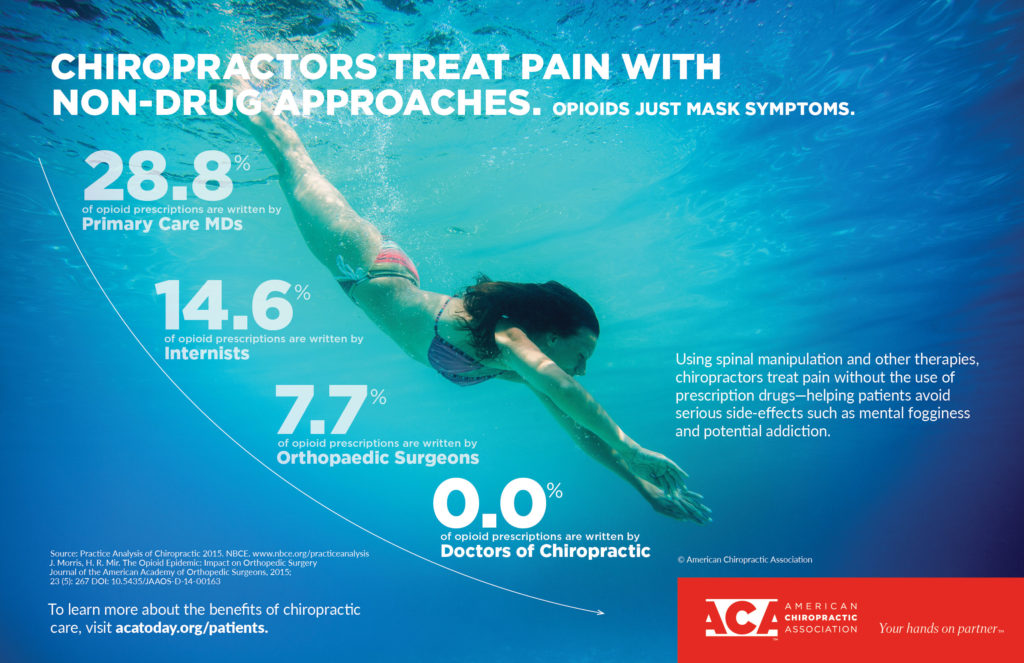
Our chiropractors specialize in conservative spine care.
Brown Integrated Chiropractic is your drug-free, surgery free healthcare option.
Providing patient-centered, evidence-based, contemporary conservative healthcare services.
Back Pain
It estimated that up to 80% of the population will experience back pain at some time in their lives.[1] Spine conditions can affect people of all ages, from adolescents to the elderly. Back pain is the third most common reason for visits to the doctor’s office, behind skin disorders and osteoarthritis/joint disorders.[2]
When we think of back pain it is common to picture heavy lifting or sports injuries. While these things can cause back pain, it is more common for an accumulation of simple movements to lead to irritation, sensitization, and pain. It is rare, but possible, that back pain is the result of other serious conditions.
Screening and categorization of your type of back pain is part of our standard intake process. While doing these we also look for individual factors that led to your condition or can personalize your recovery and treatment plan.
Through the past few decades the research has been clear. For most types of spine conditions a combination of manipulative or manual therapy, along with advice and education, as well as an active, exercise-based approach to recovery seem to be the best options. Early effective conservative care can lessen the need for prescription medication and seems to lower the surgery rate as well. This includes an extensive study of all available care for low back problems, the federal Agency for Health Care Policy and Research (now the Agency for Health Care Research and Quality) recommended that low back pain sufferers choose the most conservative care first. It recommended spinal manipulation as the only safe and effective, non-drug form of initial professional treatment for acute low back problems in adults.[3]
If you have any questions about your back issues and how conservative chiropractic care can help please contact us.
[1] Rubin Dl. Epidemiology and Risk Factors for Spine Pain. Neurol Clin. 2007; May;25(2):353-71.
[2] Sauver, JL et al. Why patients visit their doctors: Assessing the most prevalent conditions in a defined American population. Mayo Clinic Proceedings, Volume 88, Issue 1, 56–67.
[3] Bigos S, Bowyer O, Braen G, et al. Acute Low Back Problems in Adults. Clinical Practice Guideline No.14. AHCPR Publication No. 95-0642. Rockville, MD: Agency for Health Care Policy and Research, Public Health Service, U.S. Department of Health and Human Services, December, 1994.
Neck Pain
Typical causes of neck pain can include: (from the American Chiropractic Association)
- Injury and Accidents: A sudden forced movement of the head or neck in any direction and the resulting “rebound” in the opposite direction is known as whiplash. The sudden “whipping” motion injures the surrounding and supporting tissues of the neck and head. Muscles react by tightening and contracting, creating muscle fatigue, which can result in pain and stiffness. Severe whiplash can also be associated with injury to the intervertebral joints, discs, ligaments, muscles, and nerve roots. Car accidents are the most common cause of whiplash.
- Growing Older: Degenerative disorders such as osteoarthritis, spinal stenosis, and degenerative disc disease directly affect the spine.
- Osteoarthritis, a common joint disorder, causes progressive deterioration of cartilage. The body reacts by forming bone spurs that affect joint motion.
- Spinal stenosis causes the small nerve passageways in the vertebrae to narrow, compressing and trapping nerve roots. Stenosis may cause neck, shoulder, and arm pain, as well as numbness, when these nerves are unable to function normally.
- Degenerative disc disease can cause reduction in the elasticity and height of intervertebral discs. Over time, a disc may bulge or herniate, causing tingling, numbness, and pain that runs into the arm.
- Daily Life: Poor posture, obesity, and weak abdominal muscles often disrupt spinal balance, causing the neck to bend forward to compensate. Stress and emotional tension can cause muscles to tighten and contract, resulting in pain and stiffness. Postural stress can contribute to chronic neck pain with symptoms extending into the upper back and the arms.
Neck Adjustments
A neck adjustment (also known as cervical manipulation) is a precise procedure applied to the joints of the neck, usually by hand. A neck adjustment works to improve the mobility of the spine and to restore range of motion; it can also increase movement of the adjoining muscles. Patients typically notice an improved ability to turn and tilt the head, and a reduction of pain, soreness, and stiffness. Of course, your chiropractor will develop a program of care that may combine more than one type of treatment, depending on your personal needs. In addition to manipulation, the treatment plan may include mobilization, massage or rehabilitative exercises, or other therapeutic modalities.


In a study, funded by the National Institutes of Health and published in the Annals of Internal Medicine in 2012, tested the effectiveness of different approaches for treating mechanical neck pain: 272 participants were divided into three groups that received either spinal manipulative therapy (SMT) from a doctor of chiropractic, pain medication (over-the-counter pain relievers, narcotics and muscle relaxants) or exercise recommendations. After 12 weeks, about 57 percent of those who met with chiropractors and 48 percent who exercised reported at least a 75 percent reduction in pain, compared to 33 percent of the people in the medication group. After one year, approximately 53 percent of the drug-free groups continued to report at least a 75 percent reduction in pain, compared to just 38 percent pain reduction among those who took medication.
Also in 2012, research published in the Spine journal analyzed the prevalence, patterns and predictors of chiropractic utilization in the U.S. general population. The researchers found that, “Back pain and neck pain were the most prevalent health problems for chiropractic consultations and the majority of users reported chiropractic helping a great deal with their health problem and improving overall health or well-being.”
We believe chiropractic can help! If after our conversation and initial examination your chiropractor doesn’t feel conservative chiropractic care is the best option for you, we’ll help you find the right option and refer you to the appropriate specialist for your condition.
Contact us to schedule your initial examination or for more information.